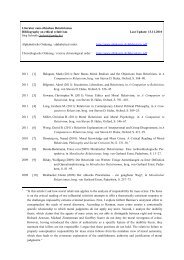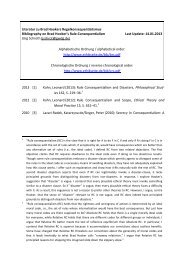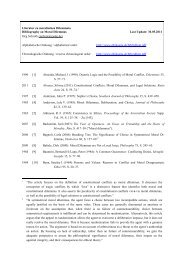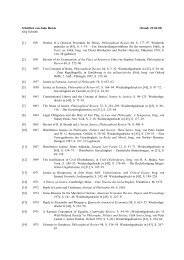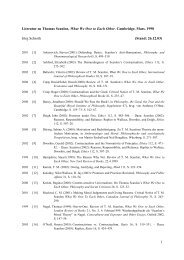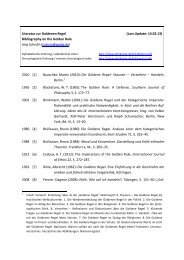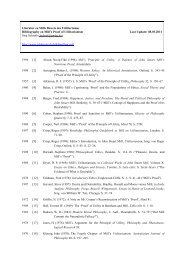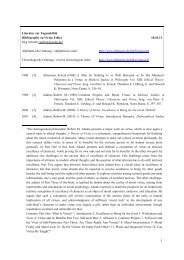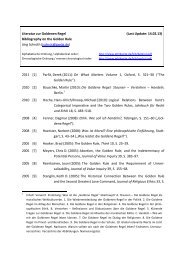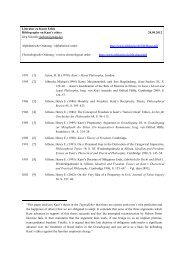Chronologische - Ethikseite
Chronologische - Ethikseite
Chronologische - Ethikseite
Create successful ePaper yourself
Turn your PDF publications into a flip-book with our unique Google optimized e-Paper software.
2012 [29] Schulzke, Marcus (2012): Kant’s Categorical Imperative, the Value of Respect, and the<br />
Treatment of Women, Journal of Military Ethics 11, S. 26–41. 9<br />
2012 [30] Silber, John (2012): Kant’s Ethics. The Good, Freedom, and the Will, Berlin.<br />
2012 [31] Stern, Robert (2012): Understanding Moral Obligation: Kant, Hegel, Kierkegaard,<br />
Cambridge, S. 5–100 ( Part I: Kant. 1. Kant, Moral Realism, and the Argument from<br />
Autonomy (7). 2. The Argument from Autonomy and the Problem of Moral<br />
Obligation (41). 3. Kant’s Solution to the Problem of Moral Obligation (68).)<br />
2011 [32] Allison, Henry E. (2011): Kant’s Groundwork for the Metaphysics of Morals: A Commentary,<br />
Oxford. 10<br />
2011 [33] Altman, Matthew C. (2011): Kant and Applied Ethics. The Uses and Limits of Kant’s<br />
Practical Philosophy, Malden, MA. 11<br />
2011 [34] Bambauer, Christoph (2011): Deontologie und Teleologie in der kantischen Ethik,<br />
action from respect for the moral law. I defend this claim against a critique put forward by Allison<br />
according to which ‘respect’ is a concept that is not, and could not be, introduced in paragraphs 9–13 of<br />
Groundwork 1. Further, I will argue that the first proposition as I understand it can also be reconstructed as<br />
the conclusion (‘Folgerung’) of a deductive argument proper; however, I will also discuss the option that<br />
‘Folgerung’ could be understood as a corollary rather than a conclusion. Finally, Allison's own<br />
interpretation will be criticized.”<br />
9 “This paper explores the relevance of Kant’s categorical imperative to military ethics and the solution it<br />
suggests for improving the treatment of women in the military. The second formulation of the categorical<br />
imperative makes universal respect for humanity a moral requirement by asserting that one must always<br />
treat other people as means in themselves and never as merely means to an end. This principle is a<br />
promising guide for military ethics and can be reconciled with the acts of violence required by war. This<br />
paper argues that it can also regulate soldiers’ relations to each other and that it may contribute to<br />
reorienting military culture in a way that overcomes the biases against female military personnel.”<br />
10 Contents: Acknowledgments. Note on sources and key to abbreviations and translations. Preface. Part One:<br />
Preliminaries. 1. The Nature of and Need for a Metaphysic of Morals: An Analysis of the Preface of GMS.<br />
2. Universal Practical Philosophy and Popular Moral Philosophy. Part Two: GMS 1. 3. The Good Will. 4.<br />
Maxims and Moral Worth Redux. 5. Kant’s Three Propositions, the Supreme Principle of Morality, and the<br />
Need for Moral Philosophy. Part Three: GMS 2. 6. Rational Agency and Imperatives. 7. The Universal<br />
Law (FUL) and the Law of Nature (FLN). 8. The Formula of Humanity (FH). 9. Autonomy, Heteronomy,<br />
and Constructing the Categorical Imperative. Part Four: GMS 3. 10. The Moral Law, the Categorical<br />
Imperative, and the Reciprocity Thesis. 11. The Presupposition of Freedom, The Circle, and the two<br />
Standpoints. 12. The Deduction of the Categorical Imperative and the Outermost Boundary of Practical<br />
Philosophy.<br />
11 Preface vi. Note on Sources and Key to Abbreviations viii. Introduction: Why Kant Now 1. Part I. Applying<br />
Kant’s Ethics 11. 1. Animal Suffering and Moral Character 13. 2. Kant’s Strategic Importance for<br />
Environmental Ethics 45. 3. Moral and Legal Arguments for Universal Health Care 71. 4. The Scope of<br />
Patient Autonomy 90. Part II. Kantian Arguments against Kant’s Conclusions 115. 5. Subjecting Ourselves<br />
to Capital Punishment 117. 6. Same-Sex Marriage as a Means to Mutual Respect 139. Part III. Limitations<br />
of Kant’s Theory 165. 7. Consent, Mail-Order Brides, and the Marriage Contract 167. 8. Individual<br />
Maxims and Social Justice 194. 9. The Decomposition of the Corporate Body 217. 10. Becoming a Person<br />
241. Conclusion: Emerging from Kant’s Long Shadow 283. Bibliography 289. Index 311.



